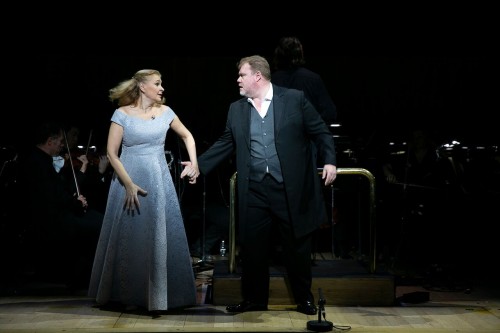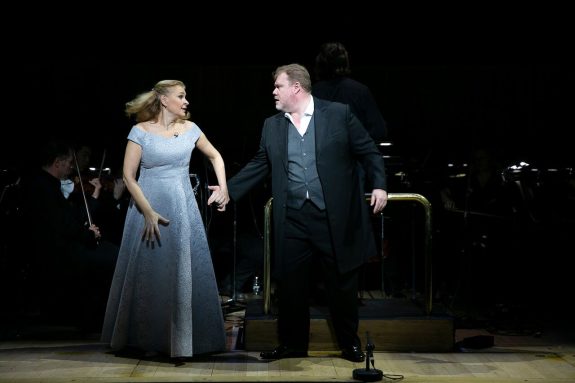 United Kingdom Wagner, Die Walküre: Soloists, London Philharmonic Orchestra / Vladimir Jurowski (conductor). Royal Festival Hall, London, 27.1.2019. (JPr)
United Kingdom Wagner, Die Walküre: Soloists, London Philharmonic Orchestra / Vladimir Jurowski (conductor). Royal Festival Hall, London, 27.1.2019. (JPr)

Cast:
Stuart Skelton – Siegmund
Markus Marquardt – Wotan
Ruxandra Donose – Sieglinde
Svetlana Sozdateleva – Brünnhilde
Stephen Milling – Hunding
Claudia Mahnke – Fricka
Kai Rüütel – Waltraute
Sinéad Campbell-Wallace – Helmwige
Alwyn Mellor – Gerhilde
Gabriela Iştoc – Ortlinde
Hanna Hipp – Rossweisse
Angela Simkin – Siegrune
Rachael Lloyd – Grimgerde
Susan Platts – Schwertleite
Lighting designer – Malcolm Rippeth
Video designer – Pierre Martin
First a topic you might not read about elsewhere: why a 60-minute second interval for a concert performance, especially when it actually proved longer than two of the acts we were listening to?
I have written before how in 1984 Reginald Goodall, then 83 and in his twilight years, conducted Die Walküre in Cardiff and how it was a revelation. He had been renowned for his expansiveness (okay slowness!), yet this performance was viscerally exciting, emotionally gripping …and surprisingly swift. Nevertheless it surely wasn’t as quick as Jurowski’s Walküre which was a little less than 3½ hours of music. Compare this to Christian Thielemann – possibly the preeminent Wagner conductor of this generation – whose performance I saw in Dresden was 3¾ hours and I thought that was quick! Jurowski is known for his Shostakovich interpretations and his Wagner now sounded a little like the Russian composer’s music, bombastic but with moments of great beauty. Throughout the London Philharmonic (seated on the level) played with characteristic radiance and there were many notable individual moments, not least, the cello solo before Siegmund’s ‘Kühlende Labung gab mir der Quell’ which – kudos to Kristina Blaumane – can rarely have sounded so beautiful and achingly reflective.
Die Walküre is where humans enter Jurowski and the London Philharmonic’s journey through Wagner’s great tetralogy. After the god-centric Das Rheingold (review click here) Wotan’s best laid plans begin to unravel. With a storm raging, Sieglinde, victim of a loveless marriage to Hunding, shelters a wounded stranger. They soon accept their attraction to each other. He is Siegmund, the twin from whom Sieglinde was separated in childhood and – unbeknownst to them – their father is Wotan, the chief god. Through Siegmund, he hopes to win back the all-powerful ring he gave away in Rheingold because he cannot reclaim it himself. Brother and sister escape from Hunding, taking with them Nothung, a sword Wotan has predestined for Siegmund. Unfortunately Wotan’s wife Fricka is goddess of marriage and she angrily demands he must not protect his incestuous children just to serve his ends, and Wotan resentfully concedes. However Brünnhilde, one of Wotan’s nine Valkyrie daughters, is determined to save Siegmund because that is what she believes her father truly wants. Wotan prevents that by shattering Siegmund’s sword, and he is killed fighting Hunding. Brünnhilde does rescue Sieglinde, and reveals she is pregnant with Siegmund’s son, Siegfried. He can be the hero Wotan needs to bring his plans to fruition. As punishment for defying him, Wotan condemns Brünnhilde to sleep on a mountaintop protected by magic fire which will put off all but the very bravest who they hope will be Siegfried.
There was no director named in the programme yet strangely Kitty Callister was listed as Costume Supervisor when all the singers were dressed formally, although there must have been a little colour coordination among the eight Valkyries. There were very occasional video projections (by Pierre Martin) to the back of the platform; mainly dark clouds and lighting flashes or some traversing of a forest floor for the stormier sequences; what looked like an ash tree in flower for the burgeoning tender moments; and the head of ‘Grane’ (Brünnhilde’s horse) near the end of the opera before the impressive (projected) flames. There were also two intrusive – and rather risible – instances when sound effects were employed: whistling winds in Act II and what sounded like crashing plates (thunder?) in Act III.
Malcolm Rippeth’s lighting consisted of little more than spotlighting the singers when the humans and gods were either at the front of the concert platform or in the choir seating and around the organ console behind the orchestra. There was plenty of movement and interaction between the singers; props were limited to a glass and a spear and there was no sword for Siegmund. The upper part was used primarily for the opening of Act III and meant that the impact of all the Valkyries’ ‘Hojotoho’-ing was lessened; individually the eight did not have the strongest of voices although they sang well in unison. It was especially hard on Ruxandra Donose’s Sieglinde – one of the truly outstanding singers we heard – to have to sing the culmination of her role – and a most rapturous ‘O hehrstes Wunder!’ – so far removed from the audience.
Mezzo-soprano Donose was as theatrically intense as a concert performance allows and vocally resplendent, even if her voice did not have the heft of Stuart Skelton’s Siegmund. He is brawny in build and voice and was very impressive in what he did if you prefer your Siegmund to be a proto-Tristan. I much prefer a more lyrical sound. His cries of ‘Wälse!’ were about the longest thing about an Act I that lasted less than an hour and of course it was not Skelton’s fault that Jurowski hurried him through ‘Winterstürme’. To paraphrase something I heard Mark Elder say recently we should have been allowed more time to ‘smell the blossom’ of this ‘Spring Song’. Nevertheless when Skelton or Donose were on stage – whether together or separately – this Die Walküre rose to another level.
This is not to suggest that there was not some other fine singing and best of the rest was Stephen Milling who brought a stylish menace and his cavernous tones to Hunding. Claudia Mahnke was full of righteous indignation as Fricka, but her voice did not have the command this role needs. It was in Thielemann’s Dresden Die Walküre (review click here) that I heard Markus Marquardt’s Wotan before. I suggested he was a ‘grizzled veteran’ and compared him to Sir John Tomlinson, but on hearing him again – because of his firm and resonant baritonal voice – he reminded me more of the wonderful Norman Bailey who I heard several times as Wotan. Last time I thought Marquardt had insufficient warmth or passion but that certainly came across to me now and, as before, ‘he harnessed his voice well enough to give Brünnhilde a noble and emotionally compelling farewell’. He had replaced a previously advertised singer and the only thing that stopped his Wotan ranking amongst the better ones I have heard was Marquardt being at odds very occasionally with Jurowski’s tempi.
For me the biggest problem with this Die Walküre was that Svetlana Sozdateleva left a gaping hole at its centre as Brünnhilde. That she is a talented singer is not in doubt, but the Royal Festival Hall is perhaps not the best place for one of your first attempts at this prodigious role. I am not certain she has ever sung it before as all her biography lists for Wagner are Sieglinde and Isabella in Das Liebesverbot since she specialises in operas by Shostakovich and Prokofiev. It might have been my ears, but I caught few of the German consonants (or some of the words) I am used to hearing. Her Act II ‘Hojotohos’ are fiendishly difficult of course but were early signs that he would struggle with the tessitura. Lower down her reverberant chest tones came to the fore during the Todesverkündigung (Annunciation of Death) that Sozdateleva sung imposingly and with expressively eloquence, whilst showing herself to be a committed actress.
Only because of what I have seen and heard before this was not a memorable Die Walküre, but I still look forward to Siegfried (my favourite of the Ring operas) next season: if Brünnhilde is not easy to cast, Siegfrieds are a species on the verge of extinction these days!
Jim Pritchard
